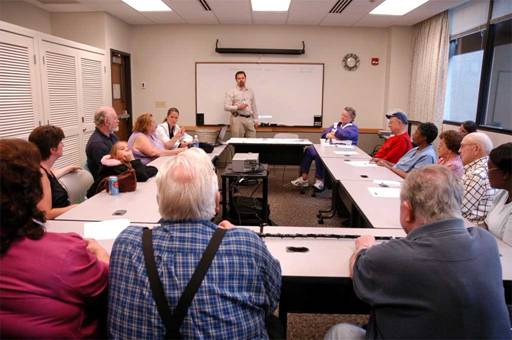Advancing Diabetes Self
Management
St. Peter Family
Medicine Residency Program
 525 Lilly Rd. NE 525 Lilly Rd. NE
Olympia, WA 98506
The St. Peter Family Medicine (SPFM) residency is one of 14 family medicine residency programs affiliated with the University
of Washington. The hospital serves 300,000 residents in
Thurston County and four adjacent counties in western
Washington. The residency program emphasizes physician
training for small town and rural practice, with special attention to
the poor and vulnerable.
The Advancing Diabetes Self Management project at SPFM was
centered on expanding the training of the provider-medical
assistant (MA) team and engaging patients in their care. The
goal of the project was to create a primary care system that
supported healthy self management for people with chronic
conditions.
A “Self Management Goal Cycle” model was used to redefine
medical team-patient
interaction. This model expanded the role of
the MA, allowing the primary care provider (PCP) to spend more
quality time with each patient. Prior to a PCP visit, the MA
conducted a “planned visit” with each patient in which vital signs,
labs, referrals, and immunizations were completed under standing
physician orders. The concepts of patient self management goal
setting were introduced and, if appropriate, the patient set a
goal. The MA followed up with a phone call to the patient two
weeks later to offer support and reinforcement and review and
update goals. The MA repeated the process three to four months
later.
Following a planned visit, a patient could choose the format of his
or her PCP clinical visit. One option was a one-on-one
PCP visit
that included medical management and self management goal
coaching. A second option was a mini-group
medical visit in which
two or three patients met with their PCP-MA
team for a one-hour
group medical/ self management goal setting session.
Patients in the mini-group
medical visit consented to share their medical information with the group so that medical management
could occur openly with input not only from the provider team, but
also from the other patients. The patients explored barriers and
successes with lifestyle change and reviewed self management
goals. They set new goals and, if patients were willing, they also
exchanged contact information. After each visit, the same set of
patients were offered a scheduled mini-group
medical visit every
three to four months.
Open office group visits offered an open forum for further
discussion among the provider team and patients. Seven to 12
patients attended each session staffed by a faculty preceptor and a
resident physician. The agenda was unstructured with the provider
team coordinating the discussion, providing medical expertise
when appropriate, and taking notes on each patient. The stress
and distress of suffering from a chronic illness was a frequent topic
of discussion. Patients supported and encouraged each other while
the providers facilitated discussion of stress management and
healthy coping strategies. The open office visits were
supplemental to the traditional individual or mini-group
medical
visits.
As a result of offering choices to patients for their care, SPFM
improved provider and patient satisfaction as well as the
quality of care for people with chronic conditions.
Summary
Key Interventions
- Medical assistant (MA) planned visits with phone follow up
- Mini-group
medical visits
- Open office drop-in
clinic
- Walking club
- Project newsletter
Key Accomplishments
- Redesigned diabetes care to offer patient choices for their
clinic visits: mini-group medical visit, traditional office visit
and/or open office visit
- Developed a curriculum for an enhanced role for MAs that
includes planned visits with patients prior to their clinic
visit
- Served as a training site for primary care settings working
toward improved chronic illness care
- Rebuilding Chronic Care Providence: Diabetes Initiative grantee, St. Peter Family Medicine Residency Program is profiled on RWJF website. Read More >
Lessons Learned
- Group and mini-group
medical visits are promising
alternatives for delivering quality diabetes care in primary
care settings
- The medical assistant plays a critical role in providing
comprehensive diabetes self management services in a
family medicine practice
- Collaborative goal setting in a primary care setting improves
diabetes self management
Grantee Presentations
Program Materials
Program Publications
|

 525 Lilly Rd. NE
525 Lilly Rd. NE